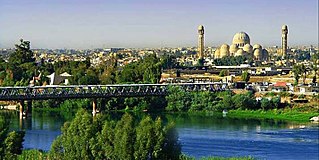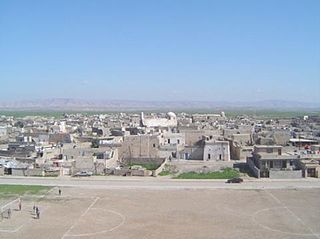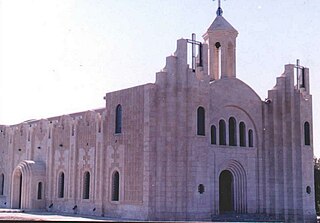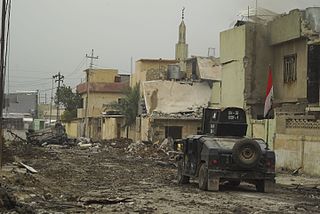Related Research Articles

Kirkuk is a city in Iraq, serving as the capital of the Kirkuk Governorate, located 238 kilometres north of Baghdad. The city is home to a diverse population of Kurds, Iraqi Turkmens and Arabs. Kirkuk sits on the ruins of the original Kirkuk Citadel which sits near the Khasa River.

Mosul is a major city in northern Iraq, serving as the capital of Nineveh Governorate. The city is considered the second-largest city in Iraq in terms of population and area after the capital Baghdad. Mosul is approximately 400 km (250 mi) north of Baghdad on the Tigris river. The Mosul metropolitan area has grown from the old city on the western side to encompass substantial areas on both the "Left Bank" and the "Right Bank", as locals call the two riverbanks. Mosul encloses the ruins of the ancient Assyrian city of Nineveh – once the largest city in the world – on its east side.

Nineveh or Ninawa Governorate is a governorate in northern Iraq. It has an area of 37,323 km2 (14,410 sq mi) and an estimated population of 2,453,000 people as of 2003. Its largest city and provincial capital is Mosul, which lies across the Tigris river from the ruins of ancient Nineveh. Before 1976, it was called Mosul Province and included the present-day Dohuk Governorate. The second largest city is Tal Afar, which has an almost exclusively Turkmen population.

Human rights in post-invasion Iraq have been the subject of concerns and controversies since the 2003 U.S. invasion. Concerns have been expressed about conduct by insurgents, the U.S.-led coalition forces and the Iraqi government. The U.S. is investigating several allegations of violations of international and internal standards of conduct in isolated incidents by its own forces and contractors. The UK is also conducting investigations of alleged human rights abuses by its forces. War crime tribunals and criminal prosecution of the numerous crimes by insurgents are likely years away. In late February 2009, the U.S. State Department released a report on the human rights situation in Iraq, looking back on the prior year (2008).

The Peshmerga comprise the standing military of Kurdistan Region, an autonomous political entity within the Republic of Iraq. According to the Constitution of Iraq, the Peshmerga and their security subsidiaries are solely responsible for the security of Kurdistan Region, chiefly due to the fact that the Iraqi Armed Forces are forbidden to enter Iraqi Kurdistan. These subsidiaries include Asayish, Parastin û Zanyarî, and Zêrevanî. The Peshmerga's history dates back to the 18th century, when they began as a strictly tribal pseudo-military border guard under the Ottoman Turks and the Safavid Iranians. By the 19th century, they had evolved into a disciplined and well-trained guerrilla force.

Tesqopa or Tel Skuf, also Tel Eskof or Tall Asqaf is a town in northern Iraq located approximately 19 miles north of Mosul. The town is populated by Assyrians and they are members of the Chaldean Catholic Church.

Bartella is a town that is located in the Nineveh Plains in northern Iraq, about 21 kilometres east of Mosul.

Qaraqosh, is an Assyrian city in the Nineveh Governorate, of Iraq located about 32 kilometres (20 mi) southeast of the city of Mosul and 60 kilometres (37 mi) west of Erbil amid agricultural lands, close to the ruins of the ancient Assyrian cities Kalhu and Nineveh.

Iraqi Assyrians are an ethnic and linguistic minority group, indigenous to Upper Mesopotamia. Assyrians in Iraq are those Assyrians still residing in the country of Iraq, and those in the Assyrian diaspora who are of Iraqi-Assyrian heritage. They share a common history and ethnic identity, rooted in shared linguistic, cultural and religious traditions, with Assyrians in Iran, Assyrians in Turkey and Assyrians in Syria, as well as with the Assyrian diaspora. Assyrian diaspora in Detroit, Areas with large expat populations include Chicago and Sydney.
Minorities in Iraq include various ethnic and religious groups.

Nineveh Plains is a region in Nineveh Governorate in Iraq, to the north and east of the city Mosul. Control over the region is contested between Iraqi security forces, KRG security forces, Assyrian security forces, Babylon Brigade and the Shabak Militia.

Ain Sifni also known as Shekhan, is a town and subdistrict in Nineveh Governorate, Iraq. It is located in the Shekhan District in the Nineveh Plains.

The Christians of Iraq are considered to be one of the oldest continuous Christian communities in the world.
Paulos Faraj Rahho was a Chaldean Catholic prelate who served as the Archeparch of Mosul in the northern part of Iraq from 2001 until his death in 2008 at the hands of terrorists.

The Nineveh Governorate election of 2009 was held on 31 January 2009 alongside elections for all other governorates outside Iraqi Kurdistan and Kirkuk Governorate.
Baqofah is a village in Nineveh Governorate, Iraq. It is located in the Tel Kaif District in the Nineveh Plains.

Bashiqa is a town situated at the heart of the Nineveh plain, between Mosul and Sheikhan, on the edges of Mount Maqlub.

The War in Iraq (2013–2017) was an armed conflict between Iraq and its allies and the Islamic State. Following December 2013, the insurgency escalated into full-scale guerrilla warfare following clashes in the cities of Ramadi and Fallujah in parts of western Iraq, and culminated in the Islamic State offensive into Iraq in June 2014, which lead to the capture of the cities of Mosul, Tikrit and other cities in western and northern Iraq by the Islamic State. Between 4–9 June 2014, the city of Mosul was attacked and later fell; following this, Prime Minister Nuri al-Maliki called for a national state of emergency on 10 June. However, despite the security crisis, Iraq's parliament did not allow Maliki to declare a state of emergency; many legislators boycotted the session because they opposed expanding the prime minister's powers. Ali Ghaidan, a former military commander in Mosul, accused al-Maliki of being the one who issued the order to withdraw from the city of Mosul. At its height, ISIL held 56,000 square kilometers of Iraqi territory, containing 4.5 million citizens.
Between 1 and 15 August 2014, the Islamic State of Iraq and the Levant (ISIL) expanded territory in northern Iraq under their control. In the region north and west from Mosul, the Islamic State conquered Zumar, Sinjar, Wana, Mosul Dam, Qaraqosh, Tel Keppe, Batnaya and Kocho, and in the region south and east of Mosul the towns Bakhdida, Karamlish, Bartella and Makhmour

The occupation of Mosul by the Islamic State began after the fall of Mosul when Islamic State fighters took control of the city on 10 June 2014. Mosul was a strategically important city for the Islamic State and was a target by anti-Islamic State forces. Over the course of battles in 2015 and 2016–2017, the Iraqi Armed Forces, aided by Peshmerga and CJTF–OIR forces, fully liberated Mosul by 21 July 2017.
References
- ↑ سبعة ضحايا بانفجار استهدف كنيسة "مار توما " وسط الموصل. al-Mada (in Arabic). 12 December 2009. Archived from the original on 25 April 2012. Retrieved 26 October 2011.
- ↑ "At least 15 killed in Iraq church blasts". Sydney Morning Herald . 3 August 2004. Retrieved 26 October 2011.
- ↑ "Archbishop Paul Faraj Rahho: The Times obituary". The Times . 14 March 2008. Retrieved 26 October 2011.
- ↑ "Thousands of Christians flee Iraq city". CNN . 16 October 2008. Archived from the original on 7 July 2012. Retrieved 26 October 2011.
- ↑ "Spokesman: Shooter in Iraqi uniform kills U.S. troops". CNN . 12 November 2008. Archived from the original on 8 July 2012. Retrieved 26 October 2011.
- 1 2 "Iraq pledges $900K to help displaced Christians". CNN . 2 November 2008. Archived from the original on 19 January 2013. Retrieved 26 October 2011.
- ↑ "Fleeing Christians Face New Hardships in Turkey". Compass Direct News. 14 November 2008. Retrieved 26 October 2011.
- ↑ "Attacks in Mosul force Christians to flee". NBC News . 10 November 2008. Retrieved 26 October 2011.
- ↑ National Public Radio – 'Some Displaced Iraqi Christians Ponder Kurds' Role' https://www.npr.org/2008/10/28/96103301/some-displaced-iraqi-christians-ponder-kurds-role
- ↑ Iraqi_MP_Peshmerga_-_not_al-Qaeda_-_targeting_Christians_in_Mosul_ http://news.trendaz.com/index.shtml?show=news&newsid=1319626&lang=EN%5B%5D
- ↑ "Kurdish expansion squeezes northern Iraq's minorities | McClatchy". Archived from the original on 9 August 2009. Retrieved 2 December 2008.
- ↑ "Sound journalism, grounded in facts and biblical truth".
- ↑ "Gulfnews: Provinces in Iraq face different challenges". Archived from the original on 9 December 2008. Retrieved 2 December 2008.